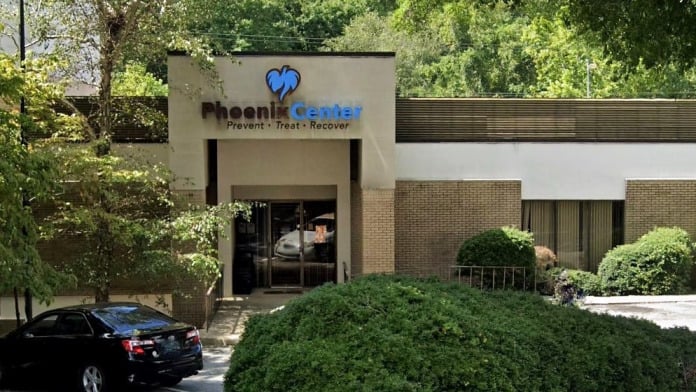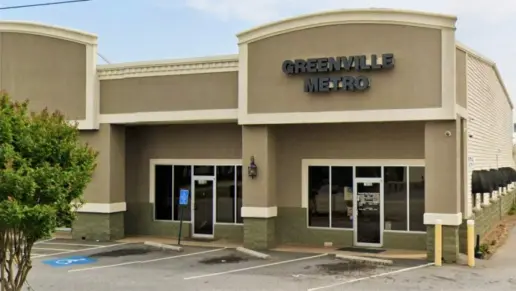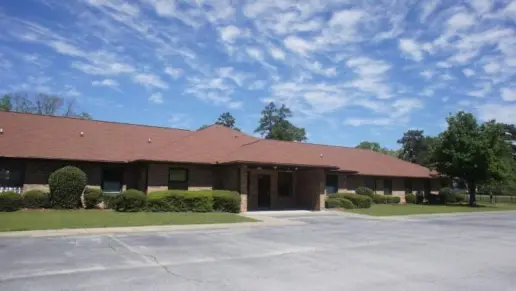They are not medically qualified to provide safe detox from opiates. they don't tell you from the start what your plan will be. It shows that they don't truly care about you and your health.
About Phoenix Center
Phoenix Center is a CARF accredited, nonprofit mental health and substance use disorder treatment center in Greenville, South Carolina. Their programs are open to adults 18 and older and adolescents 12-17. Pregnant women and intravenous drug users have priority for admission to the program. They accept most major insurance providers. They also take Medicaid. You won’t get turned away if you can’t pay.
If you need detoxification, they have a 10 bed facility onsite. During detox, you’ll have 24/7 monitoring from nurses and on call physicians. They have medication assisted treatment (MAT) if necessary. There are also counselors available. As you begin to stabilize during detox, you’ll start group therapy. It usually takes about a week to get through detox depending on your unique situation.
They have an adult residential program for men and women. You’ll get six hours of treatment daily. There’s also an outpatient program for which you can get assessed on a walk in basis Monday through Thursday at 8:15 a.m.
You can also attend Alcoholics Anonymous (AA) and Narcotics Anonymous (NA) meetings at the center. They also have family support groups. Addiction and mental health disorders create challenges for the whole family, so the center also addresses the needs of children.
There’s an adolescent outpatient program for kids ages 12-17. They’ll learn the risks of substance abuse and get intervention to avoid later substance abuse disorders. They’ll work with counselors who can help them with their emotional problems and discuss risky behaviors.
They can assess children as young as six weeks for the licensed daycare program that helps address specific issues faced by children of substance users. The daycare program works to reduce developmental problems that sometimes occur in children of substance users. They also work on parent-child bonding activities. The daycare program is licensed and is at Serenity Place and offered through the Phoenix Center.
Facility Overview
Rehab Score
Gallery

Location
Other Forms of Payment
Private insurance refers to any kind of healthcare coverage that isn't from the state or federal government. This includes individual and family plans offered by an employer or purchased from the Insurance Marketplace. Every plan will have different requirements and out of pocket costs so be sure to get the full details before you start treatment.
Self-pay involves paying for treatment out of your own pocket. You can use savings or credit, get a personal loan, or receive help from family and friends to fund your treatment. If you don't have insurance or your insurance plan doesn't cover a specific program, self-pay can help ensure you still get the care you need.
Financial aid can take many forms. Centers may have grants or scholarships available to clients who meet eligibility requirements. Programs that receive SAMHSA grants may have financial aid available for those who need treatment as well. Grants and scholarships can help you pai for treatment without having to repay.
Sliding scale payments are based on a client's income and family size. The goal is to make treatment affordable to everyone. By taking these factors into account, addiction recovery care providers help ensure that your treatment does not become a financial burden to you or your family, eliminating one barrier to care.
Medicaid is a state based program that helps lower-income individuals and families pay for healthcare. Medicaid covers addiction treatment so those enrolled can use their coverage to pay for rehab. When a program accepts Medicaid the client often pays very little or nothing out of their own pocket.
Addiction Treatments
Levels of Care
Treatments
The goal of treatment for alcoholism is abstinence. Those with poor social support, poor motivation, or psychiatric disorders tend to relapse within a few years of treatment. For these people, success is measured by longer periods of abstinence, reduced use of alcohol, better health, and improved social functioning. Recovery and Maintenance are usually based on 12 step programs and AA meetings.
Choosing a drug rehab in South Carolina helps you overcome drug dependency, learn how to manage cravings, and obtain the tools needed to prevent relapse. This is accomplished through individualized treatment that addresses a full spectrum of physical, social, and emotional needs.
Opioid rehabs specialize in supporting those recovering from opioid addiction. They treat those suffering from addiction to illegal opioids like heroin, as well as prescription drugs like oxycodone. These centers typically combine both physical as well as mental and emotional support to help stop addiction. Physical support often includes medical detox and subsequent medical support (including medication), and mental support includes in-depth therapy to address the underlying causes of addiction.
Substance rehabs focus on helping individuals recover from substance abuse, including alcohol and drug addiction (both illegal and prescription drugs). They often include the opportunity to engage in both individual as well as group therapy.
Programs



Clinical Services
The main basis of cognitive behavioral therapy in South Carolina is that all your thoughts, feelings, and behaviors are interconnected. Therefore, the therapist will help you change your thoughts, which will lead to different emotions and actions.
Group therapy is any therapeutic work that happens in a group (not one-on-one). There are a number of different group therapy modalities, including support groups, experiential therapy, psycho-education, and more. Group therapy involves treatment as well as processing interaction between group members.
In individual therapy, a patient meets one-on-one with a trained psychologist or counselor. Therapy is a pivotal part of effective substance abuse treatment, as it often covers root causes of addiction, including challenges faced by the patient in their social, family, and work/school life.
There are four fundamental processes to motivational interviewing in South Carolina. Engaging involves careful listening to understand the client's perspective. Focusing involves reaching an agreement on the purpose of the treatment. Evoking is the process of exploring the client's ideas and motivations. Planning explores how the client can make changes.
The overall goal of trauma therapy is to address and reduce the lingering physical and emotional effects that trauma has had on your life. You work within a safe space with an experienced therapist to understand your responses and develop healthier coping mechanisms.
Research clearly demonstrates that recovery is far more successful and sustainable when loved ones like family members participate in rehab and substance abuse treatment. Genetic factors may be at play when it comes to drug and alcohol addiction, as well as mental health issues. Family dynamics often play a critical role in addiction triggers, and if properly educated, family members can be a strong source of support when it comes to rehabilitation.
Recreational therapy helps you recover from drug and alcohol addiction by offering activities that improve your physical and mental health. When you participate in team sports, arts, and outdoor adventures, you engage in a positive experience that helps reduce your cravings and stress levels while giving you an opportunity to express your emotions.
Amenities
-
Residential Setting
-
Private Setting
Staff & Accreditations
Staff

CEO

COO

Chief Human Resource Officer

Finance Director

Operations Manager

Prevention Manager

Community Engagement Director

Women & Children Services Director
Accreditations

The Commission on Accreditation of Rehabilitation Facilities (CARF) is a non-profit organization that specifically accredits rehab organizations. Founded in 1966, CARF's, mission is to help service providers like rehab facilities maintain high standards of care.
CARF Accreditation: Yes
Contact Information
1400 Cleveland Street
Greenville, SC 29607


